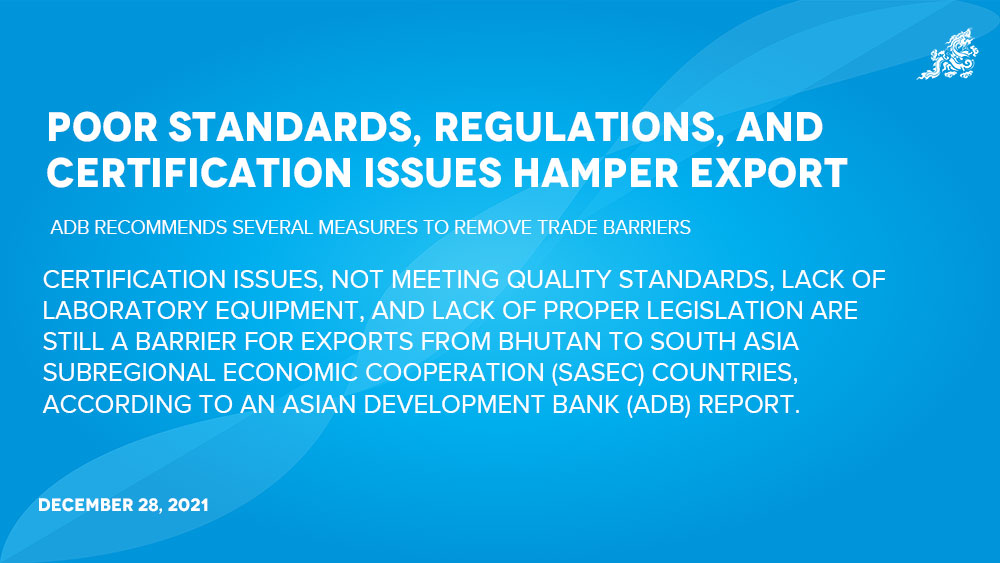ADB recommends several measures to remove trade barriers
Dechen Dolkar
Certification issues, not meeting quality standards, lack of laboratory equipment, and lack of proper legislation are still a barrier for exports from Bhutan to South Asia Subregional Economic Cooperation (SASEC) countries, according to an Asian Development Bank (ADB) report.
The member countries are Bangladesh, Bhutan, India, Maldives, Myanmar, Nepal, and Sri Lanka.
The trade barriers are in the category of sanitary and phytosanitary (SPS) and technical barriers to trade (TBTs) measures. “SPS measures” mean measures to protect humans, animals, and plants from diseases, pests, or contaminants.
The SPS certification indicates plants or plant products that have been officially inspected and are free from quarantine pests. TBTs are any regulation, standard, or procedure that could make exporting goods to another country more difficult.
The Export Association of Bhutan faces lots of challenges when exporting agriculture products and new products of finished goods of agriculture. Exporters said that they face issues with certification, product standards, and accreditations every time they export. The last issue they recalled was related to the export of apples, potatoes, and ginger oil.
“When new finished products are being exported, the certifications are not recognised by the other countries. There are no proper guidelines for exporting the products,” an exporter said.
In the context of Bhutanese trade with members of the SASEC partnership, the certification, regulations, and standardization issues restrict the volumes of potential exports.
The ADB supports the SASEC partnership with technical assistance and financing to overcome key barriers to trade.
SASEC member countries, jointly with the ADB, have prepared a series of diagnostic studies to help policy makers and the private sector improve trade ties and efficiency, specifically in the areas of certification, regulations, and standardization of products.
The report states that the SASEC partnership has clear potential to increase intraregional trade between and among its members. However, infrastructural, certification, standardization, and regulatory frameworks contribute to high costs of doing business and suboptimal trade volumes.
It states that the trade practices in Bhutan and the sub-region still encounter challenges, including minimal harmonization of regulations; limited computerization and automated systems and lack of modern customs procedures such as Harmonized System (HS) code discrepancies; and lengthy documentation with manual processing that is required in numerous copies.
It also states that it has poor testing and laboratory facilities that are not recognized by regional and international standards.
ADB recommendation
ADB recommends that Bhutan undertake a review process to develop consistency between the Food Act and the Standards Act to prevent conflicting provisions. “Bhutan should seek international accreditation for its laboratory facilities and test protocols.”
It states that accreditation for Bhutan Agriculture and Food Regulatory Authority (BAFRA) labs can address SPS barriers while accreditation for Bhutan Standard of Bureau (BSB) labs can reduce TBTs.
ABD recommends that Bhutanese stakeholders engaged with relevant agencies involved in certification with Bangladesh and India develop mutual recognition agreements and equivalent inspection and certification systems.
It states that banking transactions between Bhutanese exporters and Bangladeshi importers should be improved to avoid long payment delays. Mutual understanding between banks and traders could help make terms and conditions of letters of credit more user-friendly and beneficial to both parties.
It also recommends that existing trade and transit agreements with India under the Agreement on Trade, Commerce, and Transit should be reviewed at regular intervals to address issues encountered during everyday transit, including inadequate customs infrastructure, the limited number of entry and exit points, documentation requirements, and procedures and formalities.
The report recommends that authorities should review legislation to ensure it stipulates clear roles and responsibilities for institutions in standard setting, certification, laboratory testing, enforcement, and compliance.
In particular, BAFRA should focus its operations on being a regulatory body rather than on setting standards. It should consider relinquishing certification mandates to prevent potential conflicts of interest inherent in having both standard setting and laboratory and certification responsibilities under a single management body.
“There is a need for a clear policy to define distinct mandates between institutions, and BAFRA and the BSB should explore practical measures to help them effectively fulfill their respective mandates,” the report states.
A separate BSB metrology laboratory is required, states the report. “In its current location, vibration disturbances do not allow precise equipment calibration and testing at the lab. Establishing an independent laboratory will be necessary to address this issue.”
Adequate and efficient plant quarantine management and facilities are needed at the entry points of quarantine stations in Gelephu, Nganglam, Paro, Phuentsholing, and Samtse.
Separate laboratories would be a resource-effective approach for all SASEC countries; for example, Bhutan could specialize in testing for organic agriculture and products.
It states that Bhutan needs to strengthen high-level bilateral and regional dialogue to upgrade infrastructure facilities, equipment, and procedures in other SASEC countries that negatively affect cross-border trade for Bhutan.
The report also recommends that Bhutan engage with joint government commission structures and processes to address issues such as road strikes, customs infrastructure, increased entry and exit points for documentation, procedures, and formalities.


